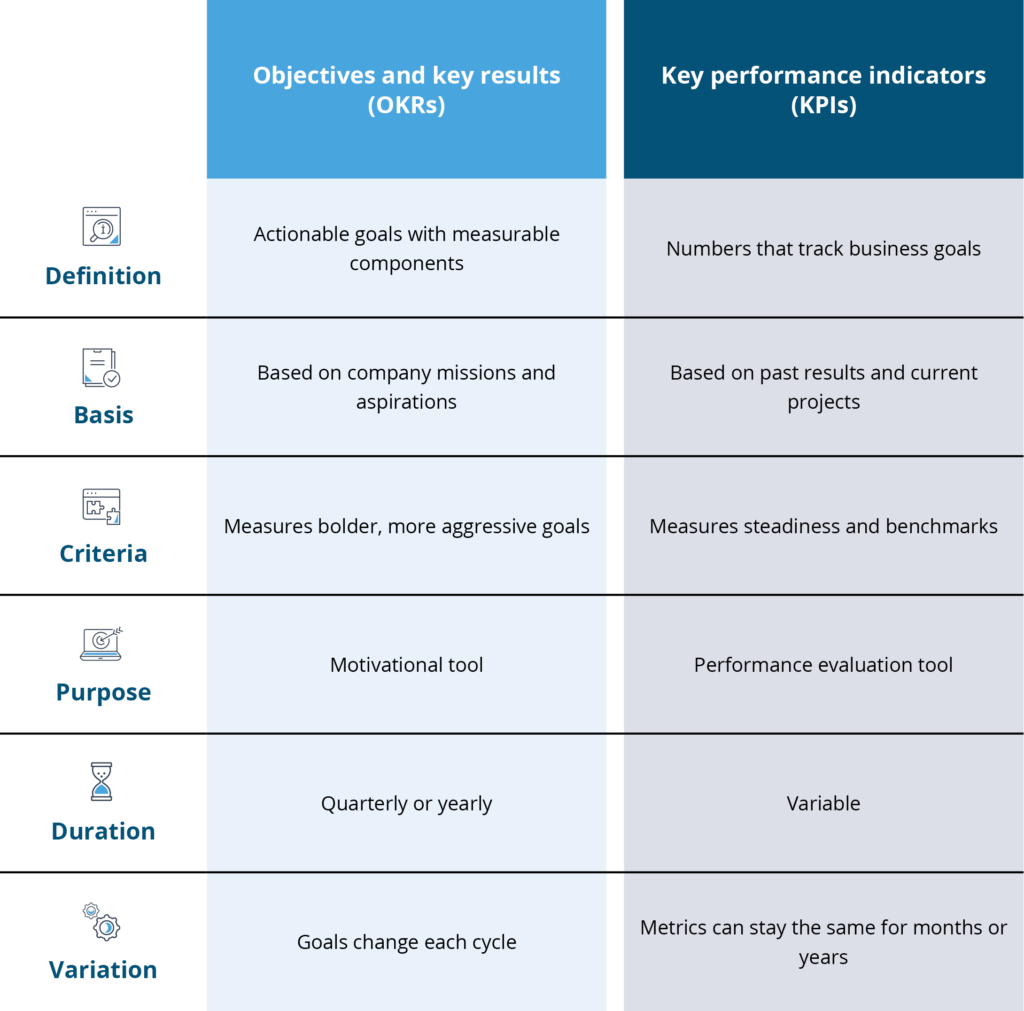
As a business owner, you have big dreams for your company and a clear vision for its future. But as much as you’d like to, you can’t do it all alone. Ensuring your team is aligned and motivated to meet your high standards is where the real challenge lies. This is where understanding the difference between setting a KPI vs OKR becomes crucial. Key Performance Indicators (KPIs) and Objectives and Key Results (OKRs)are both tools that can help keep your team focused and motivated.
What Is A KPI?
A KPI, or Key Performance Indicator, is a measurable value that shows how effectively you are achieving your key business objectives. You can use KPIs at different levels to gauge your success in reaching targets. High-level KPIs may reflect the overall performance of your business, while low-level KPIs might focus on processes in specific departments such as sales, marketing, or customer service.
Think of KPIs as benchmarks for your business’s health, providing you with clear indicators of your progress and areas that may need attention. They are crucial for you to understand where you stand in terms of your business goals and to inform the decisions that can lead to improved performance and growth.
What Is An OKR?
An OKR, or Objective and Key Results, is a goal-setting framework that helps you define ambitious goals and track outcomes. It encourages you to set challenging, aspirational objectives aligned with your company’s vision. Each objective is then paired with key results—concrete, measurable actions—that gauge your progress towards these goals.
You’ll typically review your OKRs regularly, often quarterly, to ensure you’re on course and to make adjustments as needed. This approach keeps you agile, allowing you to respond to changes in your business environment swiftly. By using OKRs, you’re not just dreaming big; you’re also putting a plan in place to turn those dreams into reality.
The Impact Of KPIs On Your Business Success
KPIs are more than just numbers; they’re the pulse of your business. By tracking KPIs, you’re equipped to make informed decisions that steer your business towards increased efficiency and profitability. They’re your indicators for when to celebrate wins or pivot strategies, ensuring that every resource is invested wisely to drive growth.
The Role Of OKRs In Strengthening Your Business
OKRs do more than set targets; they inspire your team to aim higher and achieve more. By connecting daily work to your company’s strategic objectives, OKRs transform ambitious goals into a roadmap for success. They’re about creating momentum and fostering a culture of collaboration and continuous improvement.

KPI vs OKR
To make the KPI vs OKR differentiation clearer, let’s break it down:

When To Use KPIs And When To Use OKRs
To provide practical insights, let’s explore scenarios illustrating KPI vs OKR.
When To Use KPIs
- Sales Performance Monitoring: KPIs are ideal for tracking sales targets, conversion rates, and revenue growth.
- Customer Satisfaction: Use KPIs to measure customer feedback, Net Promoter Score (NPS), and service quality.
When To Use OKRs
- Project-Based Objectives: OKRs are suitable for project teams to set goals and measure progress within a defined timeframe.
- Innovation Initiatives: Utilise OKRs when embarking on innovation-driven projects, emphasising creative and qualitative objectives.
Integrating KPIs And OKRs Into Your Business Strategy
To effectively integrate KPIs and OKRs into your business strategy, begin by pinpointing the key aspects of your business that need monitoring and enhancement. Set your KPIs to track these areas, giving you a clear picture of your current performance and operational success.
Then, define your OKRs to establish ambitious goals that challenge your team to excel and innovate. Your objectives should be clear and inspiring, with key results that act as measurable steps toward achieving these goals.
By incorporating both KPIs and OKRs into your strategy, you ensure that your day-to-day operations are in line with your broader business ambitions. This approach not only tracks where you are but also guides where you want to be, driving your business towards continuous growth and improvement.
How Allevi8HQ Can Help
As a proudly Australian accounting firm, we specialise in providing advisory services that can assist businesses in effectively implementing both KPI’s and OKR. As an experienced business advisor, we will offer you valuable insights into performance measurement and optimisation.
Final Thoughts
Understanding the distinctions between OKR vs KPI and knowing when to use them is essential for businesses in Brisbane and across Australia aiming for sustainable growth. By integrating these tools effectively and seeking the expertise of a business plan consultant such as ourselves here at Allevi8HQ, businesses can navigate KPI vs OKR effectively.

FAQs
What is the main difference between KPIs and OKRs?
KPIs are quantitative metrics used for performance assessment, while OKRs are qualitative goals for setting and tracking aspirations.
Can KPIs and OKRs be used together?
Yes, businesses often use KPIs and OKRs in tandem, leveraging the strengths of each to create a holistic performance measurement approach.
How often should OKRs and KPIs be reviewed and updated?
Regular reviews, typically quarterly, help maintain relevance and effectiveness for both KPIs and OKRs.
How do I choose the right KPIs and set effective OKRs for my business?
Seek guidance from performance measurement experts, such as ourselves, in order to tailor-make KPIs and OKRs to your specific business needs and goals.
Are OKRs suitable for every kind of business?
OKRs can be adapted to suit various businesses, provided the goals can be expressed qualitatively and have clear outcomes.

